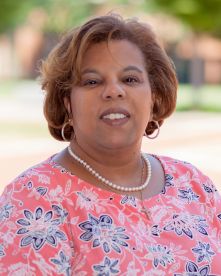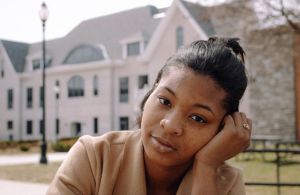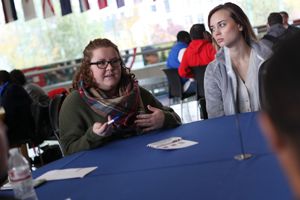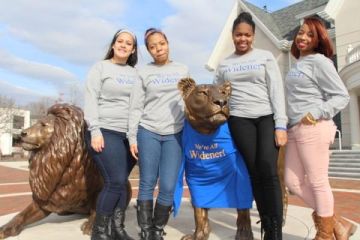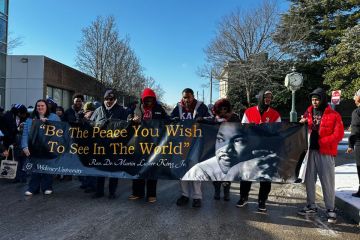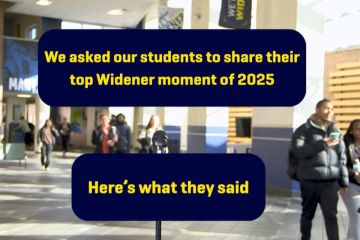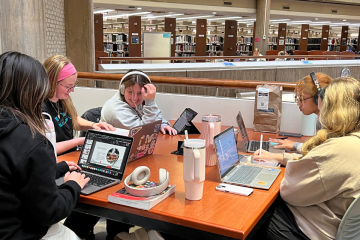Widener Community Leads Conversations on Race and Equality

As nationwide protests spark a renewed and invigorated call for racial justice, Widener students, faculty, and staff are leading conversations on racial inequities and committing long term to enact positive change in the university and the wider world.
‘We’re All Widener’ is an expression created by students in 2013 that embraces and signifies the university’s strong culture of diversity and inclusion. It serves as a call to action as the university community comes together to listen, learn, and act in the wake of the deaths of George Floyd, Breonna Taylor, Ahmaud Arbery, and other Black individuals.
The conversations kicked off earlier this month when Chief Diversity Officer Micki Davis led the virtual DiversiTEA: A Call for Change, attended by 170 faculty, staff, and students.
“Having the conversation is the first step to be able to create a space of understanding and respect. We’re able to because of who we are as a university,” said Davis.
DiversiTEAs began in late 2019, facilitated by Davis and Vice President for Strategic Initiatives and Chief of Staff Katie Herschede. They are designed as informal conversations among colleagues to collect and share information regarding current diversity initiatives and suggestions for enhancing diversity, equity, and inclusion on campus. The data and suggestions will augment the President’s Executive Team’s goal to “advance a culture of diversity and inclusion at Widener.”
Davis is planning a follow-up program for later this month called DiversiTEA: Change Begins with Me, to help people think about the changes – even small ones – they can make to move the needle.
From Dialogue to an Anti-Racist Action Plan
Widener’s Center for Civic & Global Engagement (CCGE) recently held its own discussion with faculty, staff, international students and an international scholar, focusing on systemic racism and what steps can be taken individually and as a center. In the upcoming academic year, CCGE will make anti-racism and multiculturalism a centerpiece in its work.
Efforts are also underway to bring alumni into these broader university-based conversations.
Diversity, inclusion, equity, and access have been priorities of the university for years. But Davis believes this moment offers the “opportunity to go full speed. We can look at places where we have gaps, and take a hard look at areas on campus where we don’t see a lot of diversity.”
The university’s Diversity Leadership and Inclusion Council has pledged to craft an anti-racist action plan this summer.
Also this summer, the campus will be reading White Fragility: Why It’s So Hard for White People to Talk About Racism, with three group discussions planned. A campus screening of Ava DuVernay’s documentary 13th is also in the works.
Student leaders in the Chester Community Clinic are taking action to support local organizations combating systemic racism by raising funds through a virtual summer fitness challenge. The month-long challenge invites the Widener community to participate in a one-minute daily exercise led by graduate physical and occupational students resulting in a donation made in the participant’s name.
The Office of Student Engagement (OSE) and the Student Government Association (SGA) is helping to coordinate student leadership and student organization efforts to provide trusted sources and resources for students, and to develop and offer programming around the issues.
SGA will host a virtual session on June 18 of Factuality: A 90 Minute Crash Course on Structural Inequality in America. And SGA is developing a series of forums to bring students together to promote learning and understanding.
Through education, conversation, and advocacy, incoming SGA President Arianna McRae '21 wants to ensure that students feel comfortable sharing their experiences and serving as allies for classmates and friends.
As the first Black woman to serve as SGA president, McRae, who is of West Indian heritage, hopes she can inspire others to take a stand and put themselves out there.
"I want to advocate for students who can’t speak for themselves," McRae said.
Individual clubs and organizations are also working to devise programming.
Incoming Black Student Union President Xavier Ross '22 said his group is eying educational workshops to foster more conversations, and is focusing on ways to bring Widener and the City of Chester closer together, including promoting local businesses and events.
Widener is Chester. We want to get more involved with the community as a whole, especially during this time. — Xavier Ross '22
This summer, Ross has helped organize anti-racism demonstrations in his hometown, and believes this “change in our world has to start with us. We all need to hold ourselves accountable for our perceptions."
And he is encouraged by the efforts he sees at Widener, especially the courage exhibited by students, faculty, and staff to engage in this difficult work. “I feel hopeful. I feel really excited for the changes in the Widener community,” he said.
Faculty-Led Conversations
Widener faculty across many disciplines have also been leading discussions in their courses, allowing students to better understand and participate in this defining moment for race relations in the United States and around the world. Their efforts have benefitted in part from Widener’s Common Ground Initiative, launched in 2017. Through it, the university has done trainings for faculty and staff on intergroup dialogue, to assist them in guiding thoughtful discussions about our collective similarities and differences, and to prepare faculty to more deeply explore societal issues in the classroom.
Assistant Professor of Biology Catherine Safran is teaching an anatomy and physiology course this summer, online due to COVID-19. She had students watch a film on biological factors that determine skin color during a segment on the integumentary system, prompting an insightful discussion.
“This approach is a powerful way to engage students on difficult topics such as racism and social unrest,” Safran said.
Hassa Alanazi, a first year nursing major in the course, said these discussions about race must happen in class.
“Shying away from having these discussions will only result in a bigger gap between people and those who are different from them,” Alanazi said. “Racism is taught; it’s not innate. This is why we should protect the youth from developing hatred by starting these conversations in class and transforming their ignorance into awareness.”
Alanazi’s classmate, Peter O’Connor, a senior psychology major on the pre-physical therapy track, agreed. The discussion of the biology of race made him think about the fact that all people, regardless of color, originate from the same ancestral lineage.
“If you are able to understand this simple concept, then it is easy to understand that as a collective group we are all one,” O’Connor said. He added that conversations about race can help students be more understanding.
“Silence is not going to change anything or help anyone. We have seen during these last few weeks that now is no longer the time to be silent and our voices need to be heard,” O’Connor said.
Widener Instructor of Anthropology Chelsea Abbas and Assistant Professor of Sociology Jennifer Padilla Wyse led a conversation with students on June 11 that touched on many topics, including systemic racism, policing, and action steps students can take.
Similarly, Associate Professor Brenda Kucirka is partnering with nursing students to identify ways to broaden discussions and topics covered in the Inside Out Prison Exchange Program, a semester-long course that focuses on social change through education.
The Inside Out model brings ‘inside’ men incarcerated at SCI-Chester with ‘outside’ nursing students together as a class to engage in meaningful dialogue on issues ranging from privilege and race to advocacy and self-reflection. Kucirka is working to not only build on the coursework, but to infuse it into all nursing classes.
“We are looking at how to pull social justice through the curriculum in the School of Nursing as one of our fall semester projects,” said Kucirka.

